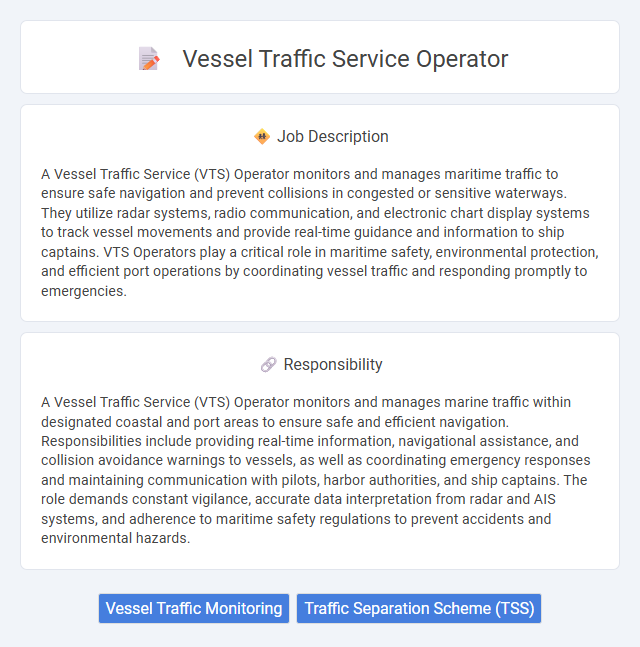
A Vessel Traffic Service (VTS) Operator monitors and manages maritime traffic to ensure safe navigation and prevent collisions in congested or sensitive waterways. They utilize radar systems, radio communication, and electronic chart display systems to track vessel movements and provide real-time guidance and information to ship captains. VTS Operators play a critical role in maritime safety, environmental protection, and efficient port operations by coordinating vessel traffic and responding promptly to emergencies.
Vessel Traffic Service Operators likely suit individuals with strong concentration and quick decision-making skills, as the role demands constant vigilance and rapid response to dynamic maritime situations. People who handle stress well and have excellent communication abilities probably perform better in this high-pressure environment. Those who prefer routine or low-stimulation jobs may find this position challenging due to its fast-paced and unpredictable nature.
Qualification
A Vessel Traffic Service (VTS) Operator must possess certification from an accredited maritime authority, demonstrating proficiency in navigation and vessel maneuvering. Candidates typically require strong knowledge of maritime communication protocols, radar operation, and emergency response procedures. Training in safety management systems and situational awareness ensures effective monitoring and guidance of vessel traffic to prevent collisions and environmental hazards.
Responsibility
A Vessel Traffic Service (VTS) Operator monitors and manages marine traffic within designated coastal and port areas to ensure safe and efficient navigation. Responsibilities include providing real-time information, navigational assistance, and collision avoidance warnings to vessels, as well as coordinating emergency responses and maintaining communication with pilots, harbor authorities, and ship captains. The role demands constant vigilance, accurate data interpretation from radar and AIS systems, and adherence to maritime safety regulations to prevent accidents and environmental hazards.
Benefit
Vessel Traffic Service Operators likely experience improved maritime safety by effectively monitoring and managing vessel movements to prevent collisions and accidents. Their role may offer valuable opportunities for specialized skill development in navigation and communication technologies, enhancing career growth potential. The position might also provide a sense of responsibility and contribution to environmental protection through efficient traffic coordination in busy waterways.
Challenge
A Vessel Traffic Service Operator likely faces the challenge of managing multiple vessel movements simultaneously to ensure safe and efficient navigation within busy waterways. The role probably demands high levels of concentration and quick decision-making skills under pressure to prevent accidents and collisions. Navigating complex communication protocols with vessels and coordinating with various maritime authorities could also present ongoing operational challenges.
Career Advancement
Vessel Traffic Service Operators play a crucial role in maritime safety by monitoring and directing vessel movements within designated waterways, ports, and harbors. Career advancement opportunities include progressing to senior operator roles, supervisory positions, and specialized maritime safety management roles, often requiring advanced certifications and continuous training. Skilled operators may also transition into maritime consultancy, regulatory compliance, or port authority management, leveraging their expertise in vessel traffic control and navigational safety.
Key Terms
Vessel Traffic Monitoring
Vessel Traffic Service (VTS) Operators play a critical role in maritime safety by continuously monitoring vessel movements within designated waterways to prevent collisions and ensure efficient navigation. They utilize radar, Automatic Identification Systems (AIS), and communication technologies to provide real-time information and guidance to vessels, enhancing situational awareness. Expert knowledge of maritime traffic patterns, regulations, and emergency protocols is essential for effective vessel traffic monitoring and incident response.
Traffic Separation Scheme (TSS)
A Vessel Traffic Service (VTS) Operator plays a critical role in managing marine traffic within designated areas, ensuring safe navigation through the enforcement of Traffic Separation Schemes (TSS). The operator monitors vessel movements using radar and AIS technology to prevent collisions, especially in congested shipping lanes where TSS is implemented to segregate opposing traffic flows. Expertise in international maritime regulations and TSS guidelines enables the VTS Operator to provide precise navigational advice, enhancing maritime safety and efficiency.
 kuljobs.com
kuljobs.com